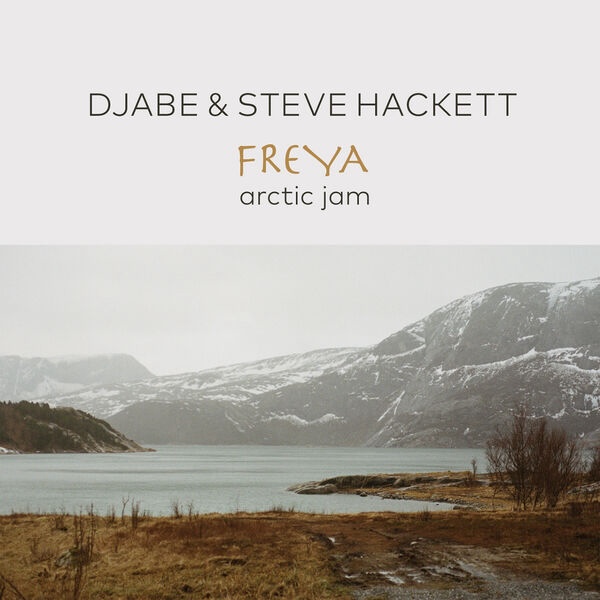
The ongoing relationship between the Genesis maestro and prolific Hungarian legends Djabe continues, seemingly a prefect partnership musically, as well as Steve’s obvious personal love for Hungarian culture. Combining modern jazz sensibilities within expansive musical channels that wander way beyond the mundane is in itself a major accomplishment, but when interfaced with Steve Hackett’s magical guitar, the creative flower blooms like a paradise garden. With Tamàs Barabàs leaning on his florescent bass guitar, in unison with the syncopation marshalled by Peter Kaszàs , the keyboards can now run rampant, and Zoltàn Bubenyàk does so with shimmering class, while Aron Koos-Hutàs adds flugelhorn and trumpet to the arrangements, as well as taking center stage when called upon. Attila Égerhàzi maintains his compositional guidance and having Hackett’s incredible tone as a cavalry charge must be quite the experience. The Hungarians surely enjoy performing all the classic Genesis and Steve’s solo material just as much as Hackett seems having a blast playing the Magyar material. What we call a perfect partnership with zero downside, only mutual respect and constant enjoyment in each others company.
The music is always a challenge to describe, a hybrid jazz, rock, African and Hungarian folk, at times ambient, meditative and progressive as well. “In the Silence “ opens the curtain on a cinematographic groove, where cool synthesizer plateaus, freezing bass fjords, and wind-blown guitar gales , together revealing an arctic feel. The Barabàs bass is particularly chatty, the pure crystalline piano notes evoking snowflakes melting on warm cheeks, the flugelhorn blaring gently like whales in the distant ocean. The jazzy guitar phrasings are masterfully restrained by Attila, letting Steve do his thing later on, where golden streaks of sunshiny bliss overtakes the arrangement, a sassy trumpet maintaining the tempo.
The bouncy “Freya” evokes the Norse myth of a goddess that can master love, beauty, fertility, war, magic and death. Not sure modern women would be able or willing to take on that many tasks but who knows, with all the superwomen around ? With hushed vocals, this piece aims for a more laid-back, accessible romp, with Hackett shooting off a few bursts from his trusted electric guitar.
Things revert to the sonic imagery that makes up the bulk of this ‘arctic jam’, a subdued trumpet recalling the very distant past, as “Stone Age Tea” should be a reference to the bubbling brew emanating from both Aron’s wind instruments, Peter’s primitive percussives and the slithering lead guitar slicing though the floating leaves. The finale is quite the blowout! A warning that precedes the incredible next four tracks that take this to an entirely other level.
Ambient jazz is where we can hear the “Whispers of The Woods”, a polyrhythmic travelogue with thrilling drum parts that show off incredible dexterity and feeling, a strong piano in tow and a sudden frolicking transition into a lighter realm, almost playfully so. This is the ideal moment for Attila and Steve to exchange fretboard phrasings, each easily identifiable and both brilliantly interlaced, a definite moody and atmospheric highlight on this album. Hackett gets to indulge himself in a performance that exhibits his creative soloing as opposed to being a bandleader, a consummate master in full control of his muse, and a timeless adventure for us in the audience. At times, I even thought I was listening to Al DiMeola, another jazz-rock icon that can really dazzle. This stunning piece has all the ingredients for perpetual fame, a modern jazz classic, if there ever was one.
Reflective, ponderous and romantic, the 9 minute + “Sliding Trees” keeps the inventive side in full flight, a serene modulation with Hackett’s harmonica causing the most initial damage, a rubbery fretless bass foray for the ages shaking off the branches and the shivering electric guitar somersaulting into celestial overtones, in almost Santana-esque caravanserai fashion, the sensual trumpet caressing the senses, the tactile piano rippling gently over the skin, utterly relaxing and yet evocative of some internal voyaging. Hackett’s second solo reaffirms the Carlos feel, repeated by a slick synthesizer flurry that boldly assumes its place. Darn, this is so good!
With a funky slap bass , “The Lost Ship” floats along willy-nilly as the trilling electric guitar phrasing sends out distress messages, compounded by a nervy synthesizer alarm, though no band members seem to abandon ship. With all hands-on board, the drums are pugnaciously abundant, the pace hurried and frantic, the blistering guitar in your face and the Barabàs solo beyond anything heard in decades, the vessel floundering and sinking fast.
The epic finale and longest track here, “A Storm is Brewing” may be the nail in the proverbial coffin, as it simply encompasses all the details expressed above and then some. The languorous tempo, the Égerhàzi guitar in full flight that foreshadows the arrival of the greying clouds with liquid fervor, the swirling synthesizer gusts, piano droplets crashing down on the rocks, the plaintive shudder of Hackett’s drenching guitar, and a melancholic bluesy trumpet bidding farewell , I can only surrender to the fact that this is majestic music at its highest level. Djabe are without question a global leader in modern jazz, owning all the attributes that make their music such a breath of freshness, a panacea for the soul .
5 polar marmalades








